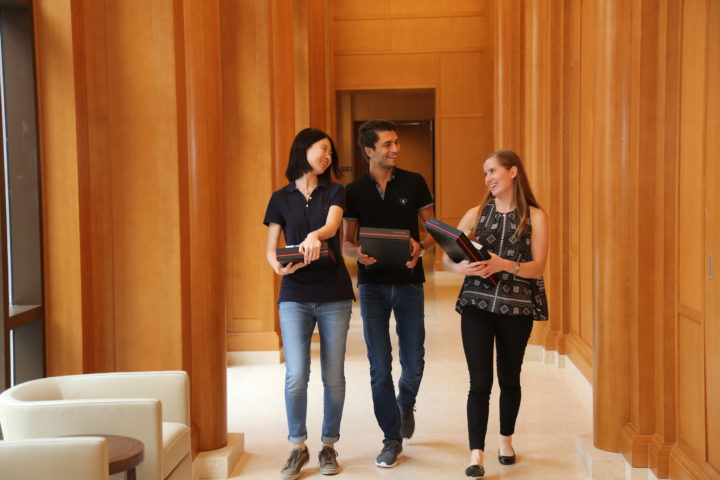What makes the Schwarzman Scholars curriculum unique? According to Executive Director Lara Tiedens, it’s the way the program responds to the current moment. “The Schwarzman Scholars curriculum,” she says, “was designed to equip Scholars with the knowledge, critical thinking, problem solving and interpersonal skills to develop into leaders amidst the changing geopolitical landscape of the 21st century.”
In the pursuit of their master’s degrees in Global Affairs, Scholars undertake a core curriculum focused on China, Global Affairs and Leadership that serves as an anchor for the rest of their studies at Schwarzman College. Additionally, they have the opportunity to choose from a variety of elective courses which explore topics related to China’s rise, current geopolitical dynamics, emerging issues in global affairs like climate change and AI, and the mechanisms of global governance. As the culmination of their Schwarzman College experience, students must also complete an individual or group Capstone project – an intensive project on a topic of the Scholar’s choosing.
The curriculum’s core courses include a survey class on Global Affairs, a class on “Forty Years of China’s Political, Economic, and Social Reform,” and a choice of leadership classes such as “Leading in Humanitarian Crises” and “Leadership in Business.” Karl Eikenberry, former US Ambassador to Afghanistan (2009-2011) and Lieutenant General in the US Army, has taught a leadership course focused on diplomacy and the military that is returning for the upcoming year. His class is a student favorite.

To prepare graduates to lead in a variety of industries, Schwarzman Scholars offers electives in a number of different subjects. Susan Shirk of the University of San Diego’s School of Global Policy and Strategy, and a leading China analyst, co-teaches a class on Chinese political institutions with Meng Tianguang, Professor of Political Science at Tsinghua University. The course covers major dimensions of Chinese political institutions, highlighting multilateral perspectives on key issues. Paul Pickowicz – also of the University of San Diego – teaches an elective on the history of modern China from 1911 to 2011, examining the interplay between Chinese culture and rapidly evolving notions of global modernity.
Last year, Schwarzman College’s academic team introduced a new elective on Asian regional security. This fall, the program will be offering a class on urbanization. Throughout their coursework, students are encouraged to explore new topics and see connections across a range of different sectors.
While about 80% of the curriculum remains the same year after year, the program is constantly updated to reflect the ever-changing state of global affairs. Around 40 courses are offered annually, and each year, five to six new ones are introduced.
In addition to electives and a core curriculum, students culminate their experience at Schwarzman Scholars with a Capstone project that reflects their learnings from the year. The individual project consists of a research paper, a case study or a policy analysis. There is also a group option through which Scholars can partner with a local organization on a China-specific topic, giving them access to professional advising from leaders in their fields. The sixth cohort explored topics ranging from the future of value-based healthcare in China to global non-fungible token policy to counter-terrorism in Burkina Faso.
The initial Schwarzman curriculum was developed in partnership between leading faculty from Tsinghua University and some of world’s top institutes of higher education, including Oxford, Stanford, Harvard, Princeton, Yale and Duke.
“It has evolved substantially over the last six years to keep up with the evolving global context and more closely focus on the core mission of the program,” notes Joan Kaufman, Senior Director for Academic Programs. With every element in the curriculum, Schwarzman Scholars is preparing the next generation of leaders for a complex new world.